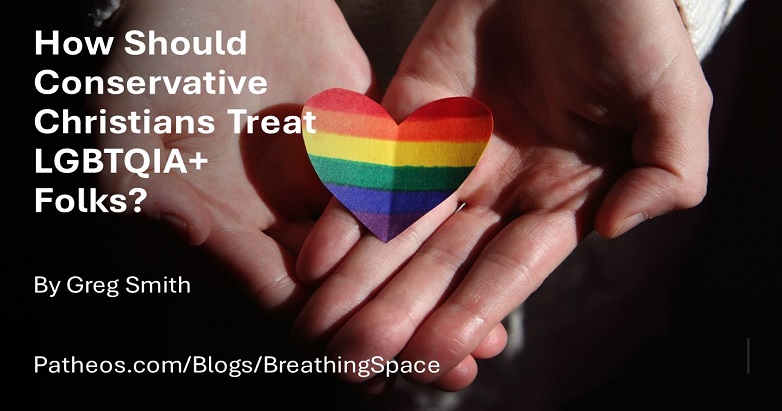“Dad, I’m bisexual.” “Mom, I’m a lesbian.” “Pastor, I’m gay.” “Boss, I’m transgender.” “Friend, I’m questioning my sexual identity.” What can you, as a conservative Christian, do when someone comes out to you? This is Pride Month–so this issue may hit home sooner than you think.

I hope you’ll keep reading–because I’m not going to try to convince you to believe anything different than you already do. Plenty of books and articles exist, making theological arguments on both sides. If you have religious or other convictions about the morality of queer folks, I’m not going to debate that. The question isn’t whether you approve or disapprove–the question is how a conservative Christian respond should when someone they love or respect comes out.
Phillip’s Encounter
Philip’s encounter with the Ethiopian eunuch in Acts 8:26-40 tells us a lot about how to treat people who are different. I invite you to read the whole story for yourself. God led Philip into friendship with a person who was as different as could be from the evangelist. Here was someone from a different nation, race, native language, religion, and a nonbinary gender expression. In biblical times, being a eunuch was the same as being a transgender person today. This was as much gender-reassignment surgery as ancient technology would allow. So, how did Philip treat this person?
First, he followed the Holy Spirit’s lead. When the Spirit told him to go, he went. He didn’t shrink from conversation, or act upon his prejudices or biases as a cisgender Jewish male. Philip probably shared the cultural perspective that eunuchs were perpetually unclean–but he refused to treat him this way. He allowed the Spirit to direct him toward relationship, contrary to his own personal feelings.
Second, Philip sat and had conversation with the eunuch. In a day when eunuchs were shunned like lepers, Philip not only ran alongside the chariot, shouting at a distance–he sat next to this person, close enough that their bodies touched. They breathed the same air and talked about the same things. This wasn’t just tolerating another person’s existence–this was Philip being willing to share his life and heart with someone, as an equal.
Third, Philip embraced the eunuch in baptism. Having baptized countless people by immersion, as was done in Philip’s day, I can tell you that it can get a little–er–intimate. You’re in the water together, your hands are on that person in a way they might not normally be. I’m not saying it’s sexual–it’s just–very personal. Philip symbolized his welcome of the eunuch by embracing him in baptism–again, recognizing him as an equal in his own eyes and God’s. He wasn’t afraid that the gayness would rub off on him in the water. |He baptized him, just as the eunuch was–without asking him to be anything but the eunuch that he’d been made to be.
This was a thing unheard of in Philip’s day. But, though most of the Hebrew scriptures condemned eunuchs as unclean, Philip knew that Isaiah’s scroll that they’d been reading from also said:
For this is what the Lord says:
“To the eunuchs who keep my Sabbaths,
who choose what pleases me
and hold fast to my covenant—
to them I will give within my temple and its walls
a memorial and a name
better than sons and daughters;
I will give them an everlasting name
that will endure forever (Isaiah 56:4-5).”
So, Philip believed that even though most of his Bible condemned eunuchs as sexually and spiritually unclean, there was hope. The prophet said that he could embrace this person of a different race, nationality, language, and gender identity. He could not just embrace them, but he could welcome them in the faith as an equal.
I’m sure that you already have an opinion about the theology surrounding the LGBTQIA+ issue. So, instead of getting into that, let me simply remind you that these dear folks are not issues to be debated, but people to be loved and respected as God’s children. Treat them as Philip would–love them as Jesus does.
What Can Christians Do?
So, what can Christians do when a lesbian, gay, bisexual, transgender, questioning/queer, intersex, or asexual (LGBTQIA) person comes out to you?
Here’s What Not to Do:
- Don’t quote Scripture to them. They’ve undoubtedly had people do that to them before, and probably know these “clobber passages” better than you do. They’re coming out to you because they’re hoping you’re a safe person, and they don’t need a lecture right now.
- Don’t tell them it’s a sin or that you’ll pray for their soul. If this is what you believe, that’s fine. But now is not the time to tell them that. Right now, they need to feel embraced. They need you to give them the same grace God has given you.
- Don’t shut them down or stop them from telling you everything. They’ve spent a long time trying to muster the courage to tell you this. Please let them get it all out, in their own words and their own way. Even if they tell you things that you don’t want to know, please let them do so, for their sake.
- Don’t ask invasive questions. It’s none of your business to ask about the specifics of what people do in the bedroom, or what type of surgeries people will have, or have had. If you want to learn more, do some research of your own–otherwise, wait until they volunteer information. Asking invasive questions just makes people feel uncomfortable.
- Don’t “out” them to other people, after they’ve come out to you. This is their story to tell, not yours. Even if you’re dying to share this news with someone, please respect their privacy. They trusted you to keep their confidence.
Here’s What to Do:
- Listen to them. James 1:26 says, “If anyone thinks he is religious and does not bridle his tongue but deceives his heart, this person’s religion is worthless.” When a person comes out, it’s their moment–not yours. Don’t make it all about you, how you feel, or about your opinions. If you have an interest in this person at all, then try to understand their perspective before you form your own.
- Remember that God hasn’t called you to judge–God has called you to love. Yes, I know you know what the Bible says. But you are not the Holy Spirit who either spotlights people’s sin or leads them in righteousness. You are the person this person needs right now, to simply love them and accept them as they are. If there’s sin in their life, God will deal with it. That’s not your job.
- If you’ve been supporting them financially, continue to do so. Maybe they’re a college student that you’ve been helping, or they own a business you support with your purchases, or they’re a service provider you’ve been utilizing. You may be tempted to stop your support, thinking that if they receive money from you then you must be condoning their behavior/identity. But what you’ll really be communicating is that you hope they starve or get evicted or withdraw from school or just cease to exist. Your money doesn’t mean you agree–it means you respect that person as a fellow human being who’s worthy of existence. If you disagree with them on this, that’s okay. You can still affirm the person financially–your dollars don’t mean you confirm your agreement. Remember, 1 Samuel 13:20 says that the Israelites took their garden tools to the Philistines to be sharpened–this doesn’t mean they condoned something they didn’t believe in. It does mean that they didn’t believe in boycotting everybody who was different from them.
- Call them by the name/pronoun they want you to use. Transgender people call their old name their “dead name,” because they feel like the old person they used to be has died, and a new person is born. Please–don’t call the person by their dead name or call them by their old gender. This is simply following the Golden Rule and doing to them what you’d want done to you. Sarai was glad when they started calling her Sarah, and people respected Abram’s transition to Abraham. But imagine how Destiny feels when you keep calling her Sam! Calling a person by their preferred name/pronoun shows that you respect them. Even if you don’t understand the new pronoun (they, them / sie, zie / hir, zir / hirs, zirs), try to respect them enough to learn it and use it.
- Tell them you’re proud of them. You don’t have to agree with everything that another person does, in order to be proud of them. Focus on the things that you do admire about that person, the areas where you can see God working in their life. This dear person’s whole life isn’t encapsulated by their gender identity or sexual orientation–there is so much more to them that you aren’t seeing if all you can focus on is this one thing.
If you’ve made it this far in the article, I’m grateful to you for sticking with me. I hope you’ll also stick with those special people in your life who come out to you as lesbian, gay, bisexual, transgender, queer, questioning, intersex, asexual, two-spirit, or nonbinary. These folks need you to be sanctuaries, safe people, in their lives. They’ve made a choice to come out of hiding, to be authentic to who they are. They’ve honored you by becoming vulnerable enough to tell you. Whatever you believe about it can wait. Now is the time to embrace. Now is the time to love. Now is the time to act like Jesus and treat these dear folks with the same compassion you had for them before they decided to trust you. Because now that they have trusted you, why would that change?












